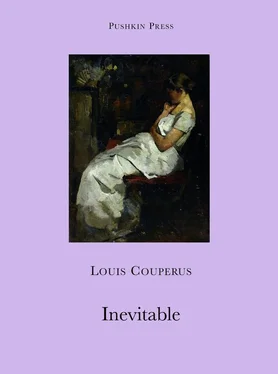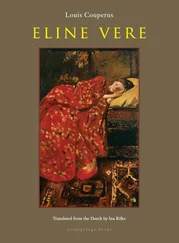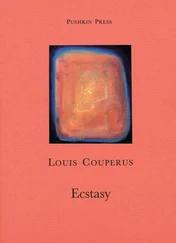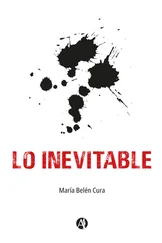“No …”
“Well, that’s why ‘la Belloni’ put Rudyard on your table. Rudyard is a Jesuit. In every pensione in Rome there’s a Jesuit who has free board and lodging, if the owner is on good terms with the church, and with great charm tries to win souls …”
Cornélie found this hard to believe.
“Believe me,” Mrs Van der Staal went on. “In a pensione like this, an important, reputable pensione , a great deal of intrigue goes on …”
“‘La Belloni’ …?” asked Cornélie.
“Our marchesa is a born intriguer. Last winter three English sisters were converted.”
“By Rudyard?”
“No, by another priest. Rudyard came here this winter.”
“Rudyard walked along with me for quite a way this morning in the street,” said young Van der Staal. “I let him talk, and sounded him out.”
Cornélie fell back in her chair.
“I’m tired of people,” she said with the strange honesty that she had in her. “I’d like to sleep for a month without seeing anyone.” And after a little while she got up, said good night and went to bed, with her head swimming …
SHE STAYED IN for a few days, and ate in her room. One morning, however, she went for a walk in the Borghese gardens and bumped into the young Van der Staal on his bicycle.
“You don’t cycle?” he asked, jumping off.
“No …”
“Why not?”
“It’s a kind of movement that doesn’t agree with my kind of person,” replied Cornélie, annoyed at meeting someone who disturbed the solitude of her walk.
“May I walk with you?”
“Of course.”
He left his bicycle in the charge of the gateman, and walked along beside her, naturally, without saying much.
“It’s so beautiful here,” he said.
His words sounded simple and sincere. She looked at him closely, for the first time.
“You’re an archaeologist, aren’t you?” she asked.
“No,” he said defensively.
“What then?”
“Nothing. Mama says that to excuse me. I’m nothing and a quite useless member of society. And not even all that rich.”
“But you’re studying, aren’t you?”
“No. I read a bit here and there. My sisters call that studying.”
“Do you like going out, as your sisters do here?”
“No, I think it’s dreadful. I never go with them.”
“Don’t you enjoy meeting and studying people?”
“No. I like paintings, statues and trees.”
“Poet?”
“No. Nothing. Really, nothing.”
She looked at him more and more attentively. He was walking beside her as if it were the most natural thing in the world, a tall thin fellow of maybe twenty-six, still more a boy than a man in his build and his face, but on the other hand with a certainty and calm that made him older than his years. He was pale, he had dark, cool, almost accusing eyes, and there was something nonchalant about his tall, thin figure in his dishevelled cycling suit, as if he cared nothing about his arms and legs.
He said nothing more, but walked beside her, easily, companionably, without finding it necessary to talk. But Cornélie became nervous and did not know what to say.
“It’s so beautiful here,” she stammered.
“Oh, it’s very beautiful here,” he replied calmly, without seeing that she was nervous. “So green, so wide, so peaceful: those long avenues, those perspectives of avenues, an ancient arch over there, and there, look, so blue, so distant, St Peter’s, always St Peter’s. Shame about all those funny things further on; that cafeteria, that milk stand … They spoil everything these days … Let’s sit down here: it’s so beautiful …”
They sat down on a bench.
“It’s so marvellous when something is beautiful,” he went on. “People are never beautiful. Things are beautiful: statues, paintings. And so are trees, clouds!”
“Do you paint?”
“Sometimes,” he admitted reluctantly. “A bit. But actually everything’s already been painted, and I can’t really say I paint.”
“Do you write too perhaps?”
“Even more has been written than has been painted. Perhaps not everything has been painted yet, but everything has been written. Every new book that has no particular scholarly importance is superfluous. All poetry has been said and every novel has been written.”
“Don’t you read much?”
“Almost nothing. I sometimes leaf through ancient writers.”
“But what do you do then?” she asked suddenly, in irritation.
“Nothing,” he said calmly, and looked at her humbly. “I do nothing, I exist.”
“Do you think that a good approach to life?”
“No …”
“But why don’t you try a different one?”
“Like buying a new jacket, or a new bicycle?”
“You’re not being serious,” she said crossly.
“Why are you so angry with me?”
“Because you irritate me,” she said in annoyance.
He got up, took his leave very politely, and said:
“Then I’d rather go and cycle a bit.”
And he slowly walked off.
“Idiotic fellow!” she thought petulantly.
But she was upset at having squabbled with him, because of his mother and his sisters.
IN THE HOTEL, however, he talked politely to Cornélie as if there had been no edgy exchanges or petty tiff between them, and he even asked her quite naturally — since Mama and his sisters had a call to make that afternoon — if they could go to the Palatine together.
“I was there recently,” she said nonchalantly.
“And aren’t you going to visit the ruins?”
“No.”
“Why not?”
“They don’t interest me. I just can’t see anything of the past in them. All I see are ruins.”
“But then why did you come to Rome?” he asked in annoyance.
She looked at him, and could have burst out sobbing.
“I don’t know,” she said humbly. “I could have gone elsewhere … But I had expected so much of Rome, and Rome is a disappointment.”
“How’s that?”
“I find Rome hard and relentless, and without feeling. I don’t know why, but that’s the impression I get. And at present I’m in the sort of mood where on the contrary I need something sensitive and soft.”
He smiled.
“Come on,” he said. “Come with me to the Palatine. I must show you Rome. Rome is so beautiful.”
She felt too sad to be alone, and she quickly dressed and left the hotel with him. Outside the coachmen cracked their whips. “ Vuole, vuole? ” they cried.
He chose one.
“This is Gaetano,” he said. “I always take him, he knows me, don’t you, Gaetano?”
“ Si, signorino. Cavallo di sangue, signorina! ” said Gaetano, pointing to his horse.
They set off.
“I’m always afraid of those coachmen,” said Cornélie.
“You don’t know them,” he replied, smiling. “I like them. I like ordinary people. They’re nice people.”
“You like everything about Rome.”
“And you are giving in unreservedly to a false impression.”
“Why false?”
“Because that initial impression of Rome, of hardness and insensitivity, is always the same and always wrong.”
“I find Rome difficult.”
“Oh yes. Look, we’re passing the Forum.”
“When I see it, I think of Miss Hope and her orange lining.”
He said nothing, angry.
“And here is the Palatine.”
They got out of the carriage and went through the entrance.
“This wooden staircase takes us to the palace of Tiberius. Above this palace, above these arches, is a garden, from where we have a view of the Forum.”
“Tell me about Tiberius. I know there were good and bad emperors. We learned that at school. Tiberius was a bad emperor, wasn’t he?”
Читать дальше












